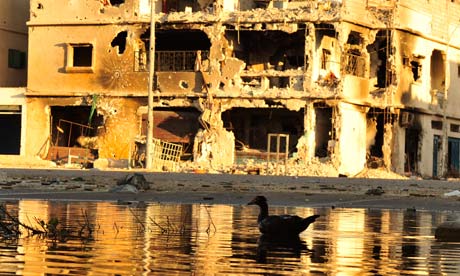Results 1 to 2 of 2
Thread Information
Users Browsing this Thread
There are currently 1 users browsing this thread. (0 members and 1 guests)
-
10-22-2011, 10:53 PM #1Senior Member


- Join Date
- May 2007
- Location
- South West Florida (Behind friendly lines but still in Occupied Territory)
- Posts
- 117,696
British firms urged pack suitcases rush for Libya business
British firms urged to 'pack suitcases' in rush for Libya business
New defence secretary says companies should be ready to cash in on reconstruction contracts in newly liberated Libya
Jo Adetunji
guardian.co.uk, Friday 21 October 2011 18.37 EDT

A duck swims near a destroyed building in the Libyan town of Sirte. Photograph: Esam Omran Al-Fetori/Reuters
The starting pistol for British firms to pursue contracts in Libya has been fired by the new defence secretary, Philip Hammond, who urged companies to "pack their suitcases" and head there to secure reconstruction contracts.
As Nato announced that it plans to wind up operations in Libya, Hammond said that great care had been taken during the campaign to avoid destroying critical infrastructure.
"Libya is a relatively wealthy country with oil reserves, and I expect there will be opportunities for British and other companies to get involved in the reconstruction of Libya," he told the BBC in an interview.
"I would expect British companies, even British sales directors, [to be] packing their suitcases and looking to get out to Libya and take part in the reconstruction of that country as soon as they can," said Hammond, who replaced Liam Fox as defence secretary a week ago.
He added that after a "hugely successful" British mission in Libya, Britain now needed "to support the Libyans to turn the liberation of their country into a successful stabilisation so that Libya can be a beacon of prosperity and democracy in north Africa going forward."
The National Transitional Council has already said that it intends to reward countries who showed support for its fight against the Gaddafi regime, with Britain and France likely to lead the way.
The success of British contractors in the country â which could see billions of pounds spent on reconstruction over the next decade â will be seen as a huge victory for prime minister David Cameron, who visited Tripoli and NTC members last month, along with Nicolas Sarkozy.
British gains in Libya include business and reconstruction contracts, as well as oil. As Libya's £100bn in frozen assets around the world are released, it is a sizeable pot.
Lord Green, a trade minister, has already met with British firms to discuss potential opportunities in Libya, and oil company BP is believed to have already held talks with the NTC.
In a press conference in September, Mustafa Abdul Jalil, the interim Libyan prime minister, praised the "brave positions" of Cameron and Sarkozy. "They showed us political, economic and military support, which helped the rebels establish a state, and we thank France and the UK for that," he said.
But while Guma al-Gamaty, the NTC's UK representative, has said Libya would honour contracts signed under the Gaddafi regime, he has also indicated that British companies might not get "easy business" from Libya.
"There will be huge changes in everything â in the oil and gas sectors, in education, and with the creation of new industrial sectors," he said. "But it's not a guaranteed market. Contracts will be awarded not on the basis of political favouritism, but on merit, quality and competitiveness."
France has already begun its own campaign to secure business in the country. French foreign minister Alain Juppé has said it was only "fair and logical" for its companies to benefit.
Daniel Kawczynski, a Conservative backbencher and chair of the cross-party parliamentary group on Libya, said Britain should come first when it comes to awarding contracts, which would also pay back some of the cost of some £300m spent on military action.
"The question that remains is, who should ultimately bear this cost?" he said. "Should the burden fall on those who could be counted on? Or should, in time, Libya repay those who fought with her, and for her?"
He added: "In these difficult economic times, it should not be too much to ask a country with Libya's wealth and resources to pay their share of the gold."
http://www.guardian.co.uk/world/2011/oc ... a-businessJoin our efforts to Secure America's Borders and End Illegal Immigration by Joining ALIPAC's E-Mail Alerts network (CLICK HERE)
-
10-22-2011, 11:07 PM #2Senior Member


- Join Date
- May 2007
- Location
- South West Florida (Behind friendly lines but still in Occupied Territory)
- Posts
- 117,696
If I was from Libya ... and you brought your goat smelling ass to my country after bombing the Inrfastructure; schools; critical water pipelines with that attitude"The question that remains is, who should ultimately bear this cost?" he said. "Should the burden fall on those who could be counted on? Or should, in time, Libya repay those who fought with her, and for her?"
He added: "In these difficult economic times, it should not be too much to ask a country with Libya's wealth and resources to pay their share of the gold."
you wouldnt be there very longJoin our efforts to Secure America's Borders and End Illegal Immigration by Joining ALIPAC's E-Mail Alerts network (CLICK HERE)


 LinkBack URL
LinkBack URL About LinkBacks
About LinkBacks




 Reply With Quote
Reply With Quote

Here We Go Again: Hundreds of Illegals Storm Border Fence in El...
04-18-2024, 12:26 PM in illegal immigration News Stories & Reports